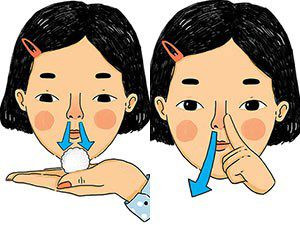Blowing your nose incorrectly can cause sinusitis and deafness.
Not everyone knows how to blow their nose properly. Meanwhile, according to ENT specialists, blowing your nose incorrectly can cause deafness, sinusitis, sore throat...
Deafness due to blowing nose incorrectly
12-year-old Nhat Linh (Ha Dong - Hanoi) suffered from allergic rhinitis. When her mother bought her nasal drops, she actively cleaned her nose, but then her ears started ringing. Nhat Linh's mother said that after cleaning her nose, she still felt stuffy and uncomfortable. Because she didn't know how to cover one side to blow her nose, she kept blowing her nose out both sides. After her ears started ringing, her mother took her to see a doctor and the doctor said she had otitis media due to blowing her nose incorrectly.
 |
| Children need to be taught how to blow their nose properly. |
According to Dr. Nguyen Ngoc Phan (ENT Clinic on Thanh Cong Street - Ba Dinh - Hanoi): "Deafness or hearing loss in old age is a very common disease. The cause can be related diseases, but it can also be due to personal habits such as blowing your nose incorrectly"
Symptoms of deafness in the early stages are that the patient only hears a buzzing, buzzing sound in the ear, gradually the sounds become unclear. In addition to patients with congenital deafness, some people are deaf due to age. In addition, otitis media can also lead to deafness if left untreated.
However, there are many cases where children and middle-aged people have the habit of blowing their nose, sniffing, and sneezing strongly, which can interfere with the auditory nerves, leading to deafness.
According to doctors at the Central Institute of Otolaryngology, blowing your nose seems simple, but not everyone does it correctly. The nose and ears are connected through the Eustachian tube, and the nose and sinuses are connected through the sinus openings. When you blow your nose incorrectly, you will push nasal mucus mixed with pathogens such as viruses and bacteria into the ear, causing ear infections, or into the sinuses, causing sinusitis; or into both the ear and sinuses, causing further inflammation of both the ear and sinuses. The correct way to blow your nose is to open your mouth and blow each side. When your nose is stuffy, you should not wash and blow anymore. It is best to take it to a specialist to have it suctioned out.
How to blow your nose properly?
Runny nose is the most common disease, especially when the weather changes. In Vietnam, allergic rhinitis is also a common disease of many people. According to ENT specialists, blowing your nose properly also needs to be learned. Although blowing your nose is a natural reaction to expel stagnant substances and mucus from the nose to regain ventilation and ease of breathing. But blowing your nose incorrectly is very dangerous, especially for young children. When mucus from the sinuses flows to the nose containing fluid stimulated by factors such as heat, cold, dust, etc., it will become thicker, causing congestion in the nose.
Usually, children do not know how to blow their noses but instead inhale strongly, causing these substances to go down the throat and back into the sinuses, causing sinusitis. Moreover, when blowing their noses, children often cover both nostrils to blow, causing the stagnant substances to also go back into the sinuses, causing pharyngitis and bronchitis.
According to Dr. Nguyen Ngoc Phan, blowing your nose properly will help the patient push some of the pus out of the sinuses. Only blow your nose when both nostrils are clear. When blowing your nose, only cover one nostril at a time, not both. The other nostril must be clear for air to flow out.
“When blowing your nose, the air pressure in the nasopharynx increases very high, up to +200mmH2O. If you blow your nose incorrectly, your ears may make a popping sound and then tinnitus because the air is pushed into the Eustachian tube and eardrum, bringing along pus and bacteria, causing complications such as acute otitis media, Eustachian tube obstruction, and closed tympanic membrane otitis. Do not blow your nose when your nose is stuffy. When blowing your nose, only cover one side and leave the other side open.” - Dr. Phan recommends.
According to Infonet

.png)






